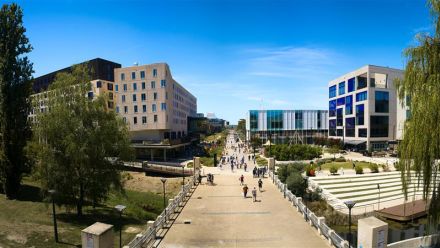Designing modern Australia
Then - Changing the landscape of Australian policy
The funding of the university sector had been a political football for decades until an ANU academic stepped into the debate.
After Prime Minister Gough Whitlam's abolition of university fees in 1974, there was a gradual political consensus that the concept of 'free' tertiary education was untenable due to increasing student numbers and associated costs.
Yet how to fix that problem stumped the politicians, until a young ANU economist named Bruce Chapman, BEc (Hons) '74, entered the debate.
As part of a wide-ranging options paper to then Federal Minister for Education John Dawkins, Chapman suggested introducing an income contingent loan (ICL) to fund the sector. Admittedly "naïve" to party politics, Chapman thought it would be unpopular but was not prepared for the public outcry about the idea, particularly from students and a resistant Hawke Government Cabinet.
Yet Dawkins persisted, with Chapman fine-tuning the proposals and, in 1989, the Higher Education Contribution Scheme (HECS) was introduced.
HECS was the first major ICL anywhere in the world. ICLs differ critically from normal loan schemes in that repayments occur if, and only when, the debtor's income reaches a certain level.
HECS required all undergraduates and postgraduates, with exceptions for those with exemption scholarships, to contribute an annual fee, initially set at $1,800 for a full-time student. This fee would be payable in advance or deferred until after the student had entered the workforce.
Chapman's work on ICLs has since been used in many other Australian sectors, including child care rebates, and he has worked on similar systems in higher education sectors in the UK, New Zealand and Ethiopia, among other countries.
It has also fuelled debate in areas as disparate as drought relief and solar energy, with ANU Professor Ken Baldwin leading the way in a proposed Solar Energy Contribution Scheme to address the social equity issues caused by rising electricity prices.
ANU public policy research and development plays a large role in modern Australia. ANU Emeritus Fellow John Deeble was the joint chief creator of the Whitlam Government's universal health scheme. Along with his economist colleague Dick Scotton, Deeble devised Medibank, which was reintroduced as Medicare by the Hawke Government in 1984.
Recent research into income inequality in Australia and its socioeconomic impacts has been led by ANU Professor Peter Whiteford, while a number of ANU academics, including Professor Warwick McKibbin AO and Dr Frank Jotzo, have been at the forefront of climate change policy, particularly in relation to the Kyoto and Paris global agreements.
More than 25 years on from the introduction of HECS, ANU academics continue to shape, lead and influence public policy debate. Associate Professor Ben Phillips has played an important ole in the negative gearing modelling used by the Federal Government and Opposition in 2016 and Professor Tom Kompas is at the heart of the nation's research into biosecurity policy.
Now - Flexibility in taxes
The future of a functioning and flexible tax system in Australia is more important now than in previous decades.
That's the view of Professor Miranda Stewart, who is steering tax research and policy development as Director of the Tax and Transfer Policy Institute.
"There are important system-wide challenges that will impact over the long term. Our politics today is quite short-term focused," she says.
"Income tax has played a large role in how Australia has become a major global economy and it's important we continue that in a changing economy.
"In the 2000s, major tax reforms were introduced on a revenue neutral or cost basis but, because of the fiscal deficit Australia has, that can no longer be done."
The founding of the Institute was one of the key recommendations from the landmark Australia's Future Tax System Review in 2010, led by former Treasury Secretary Dr Ken Henry AC.
It carries out research on tax and transfer policy, law and implementation for the public benefit in Australia and is based in the Crawford School of Public Policy at ANU.
"It's very exciting to come into a place that is new, to shape it into something that can work for the long term," Stewart says.
"The Crawford School's reputation for excellent public policy certainly helps and I want to encourage our academics to engage in the public debate.
"One of the things we can do in this Institute is collate empirical data on how people respond to taxes and look at their longterm impact.
"Politics is the reason why we have taxes in the first place and that is what drives me to inform our politicians about tax reform."


